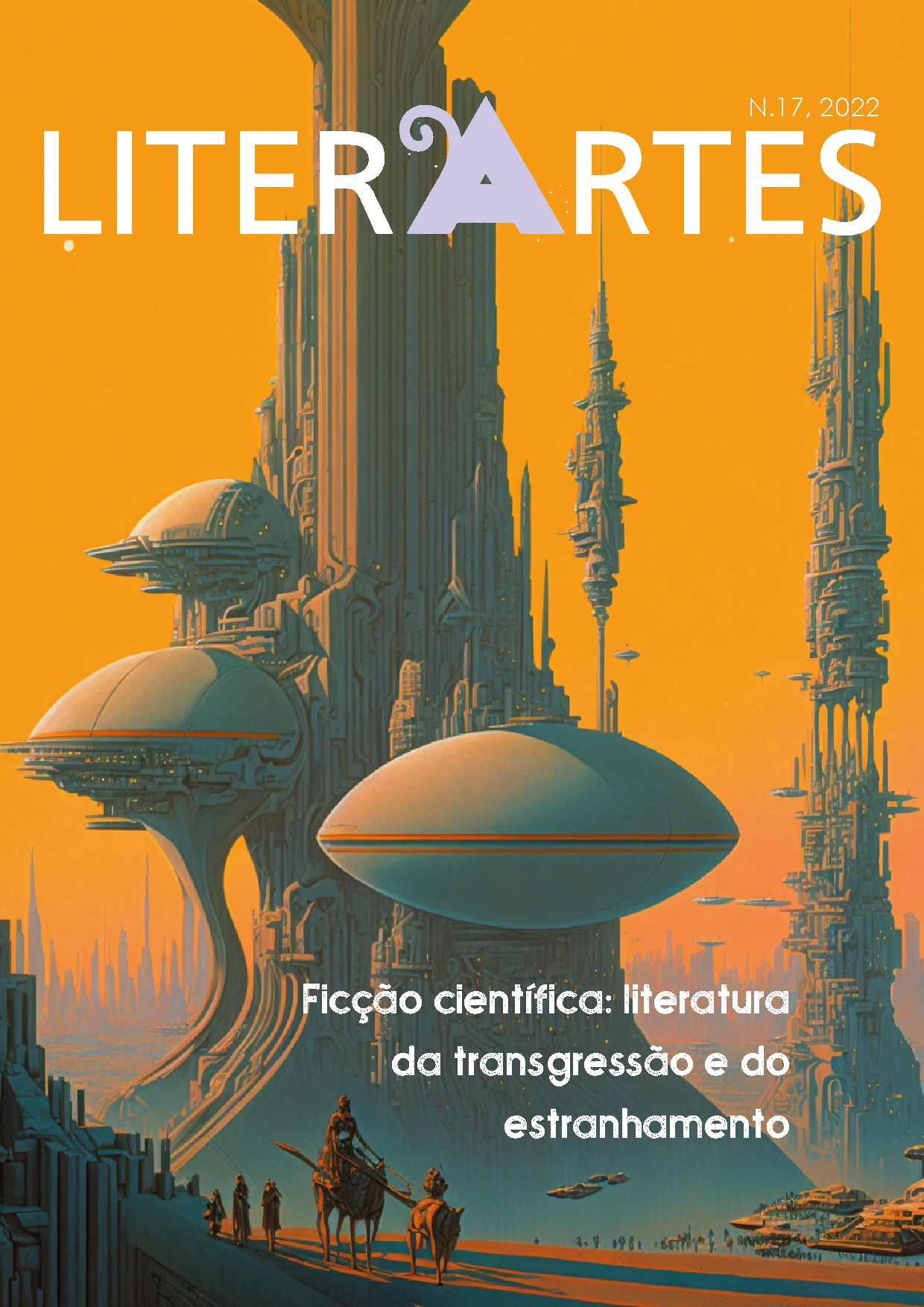A forma do porvir: literatura vitoriana, a máquina, as classes ou sobre a ficção científica de H. G. Wells en fin de siècle e um estudo sobre The time machine
DOI:
https://doi.org/10.11606/issn.2316-9826.literartes.2022.184251Palavras-chave:
H. G. Wells, Ficção científica, Literatura vitoriana, Romance industrial, DistopiaResumo
O principal objetivo deste artigo é demostrar como o romance vitoriano The time machine de H. G. Wells reverbera, pelas óticas da ficção científica e distópica, questões (de ordem, sobretudo, social) intensamente exploradas no gênero romanesco industrial, também nomeado condition-of-England novels, ao exemplo das lutas de classes e da desumanização para com o proletariado no nicho industrial. Para tanto, recuperamos tanto histórica quanto teoricamente todos os referidos gêneros e formas literários.
Referências
AMIS, Kingsley. New maps of hell: A survey of Science-Fiction. New York: Harcourt, Brace & Company, 1960.
ARAÚJO, Naiara. Ficção científica e distopia: considerações acerca da cidade e do corpo em Umbra (1977) e Asilo nas torres (1979). Afluente, v. 3, n. 7, pp. 172-183, 2018. Disponível em: bit.do/eLtLc. Acesso em 10/3/2019.
BAIROCH, Paul. The working population and its structure. New York: Gordon & Breach, 1968.
BERCHEZ, Amanda. Sobre história e teoria da ficção distópica. Revista de Estudos de Cultura, v. 2, n. 17, pp. 23-38. Disponível em: seer.ufs.br/index.php/revec/article/view/17190. Acesso em: 25/5/2022.
BRANTLINGER, Patrick; THESING, William (ed.). A companion to the Victorian novel. John Wiley & Sons, 2005.
CANDIDO, Antonio. Literatura e sociedade: Estudos de teoria e história literária. Rio de Janeiro: Ouro sobre Azul, 2011.
CLAEYS, Gregory. The Cambridge Companion to utopian literature. Cambridge: Cambridge University Press, 2010.
DICKENS, Charles. Hard Times. Nova York: W. W. Norton & Company, 2016.
DINIEJKO, Andrzej. Condition-of-England Novels. The Victorian Web (Literature, History & Culture in the age of Victoria), v. 22, 2010. Disponível em: bit.ly/2NXChTD. Acesso em 24/2/2021.
DISRAELI, Benjamin. Coningsby: or the new generation. London: H. Colburn, 1844.
ECHTERLING, Clare. Degeneration and the Environment in Victorian and Edwardian Fiction. Tese de doutorado submetida à University of Kansas, 2018.
ELIOT, George. The natural history of German life. George Eliot Archive. Disponível em: georgeeliotarchive.org/items/show/100. Acesso em 3/3/2021.
FREEDGOOD, Elaine. The ideas in things: fugitive meaning in the Victorian novel. Chicago: University of Chicago Press, 2006.
GASKELL, Elizabeth. Mary Barton. Leicester, Reino Unido: W. F. Howes Ltd., 2013.
KASSAB, Álvaro. Sobre distopias, autoengano e a perspectiva de um futuro fracassado. Jornal da UNICAMP, 2018. Disponível em: bit.do/eHeEq. Acesso em: 31/1/2019.
KUMAR, Krishan. Utopia and anti-utopia in Modern Times. London: Blackwell, 1991.
MANLOVE, Colin. Charles Kingsley, H. G. Wells and the machine in Victorian fiction. Nineteenth-Century Literature, v. 48, n. 2, (Sep. 1993), pp. 212-239. Disponível em: jstor.org/stable /2933891. Acesso em 25/2/2021.
MOYLAN, Tom. Scraps of the untainted sky. Boulder: Westview Press, 2000.
PARTINGTON, John. H. G. Wells: A political life. Utopian Studies, 2008, pp. 517-576.
RABKIN, Eric S.; GREENBERG, Martin H.; OLANDER, Joseph D. (ed.). No place else: Utopian and dystopian fiction. Carbondale and Edwardsville: Southern Illinois University Press, 1983.
ROBERTS, David. Paternalism in Early Victorian England. London, Croom Helm, 1979.
SUVIN, Darko. Victorian Science-Fiction in the UK: The discourses of knowledge and power. Boston: G. K. Hall, 1983.
The European Convention on Human Rights. European Court of Human Rights Council of Europe. Disponível em: echr.coe.int/documents/convention_eng.pdf. Acesso em: 18/4/2021.
The Human Rights Act (1998). Disponível em: legislation.gov.uk/ukpga/1998/42/contents. Acesso em 18/4/2021.
TROLLOPE, Frances. The life and adventures of Michael Armstrong, the factory boy. London: Colburn, 1840.
Universal declaration of human rights. United Nations General Assembly, Paris, 1948. Disponível em: un.org/en/about-us/universal-declaration-of-human-rights. Acesso em: 18/4/2021.
WELLS, Herbert George. The time machine and The island of Doctor Moreau. New York: Oxford University Press, 1996.
WHEELER, Michael. English fiction of the Victorian period (1830-1890). 2nd edition. New York: Routledge, 2013.
Downloads
Publicado
Edição
Seção
Licença
Copyright (c) 2022 Amanda Naves Berchez

Este trabalho está licenciado sob uma licença Creative Commons Attribution-NonCommercial 4.0 International License.
Autores que publicam nesta revista concordam com os seguintes termos:
- Autores mantém os direitos autorais e concedem à revista o direito de primeira publicação, com o trabalho simultaneamente licenciado sob a Licença Creative Commons Attribution que permite o compartilhamento do trabalho com reconhecimento da autoria e publicação inicial nesta revista.
- Autores têm autorização para assumir contratos adicionais separadamente, para distribuição não-exclusiva da versão do trabalho publicada nesta revista (ex.: publicar em repositório institucional ou como capítulo de livro), com reconhecimento de autoria e publicação inicial nesta revista.
- Autores têm permissão e são estimulados a publicar e distribuir seu trabalho online (ex.: em repositórios institucionais ou na sua página pessoal) a qualquer ponto antes ou durante o processo editorial, já que isso pode gerar alterações produtivas, bem como aumentar o impacto e a citação do trabalho publicado (Veja O Efeito do Acesso Livre).



